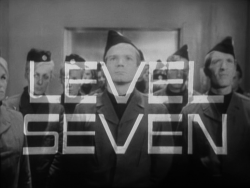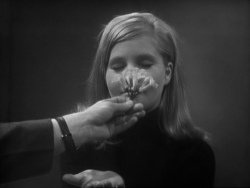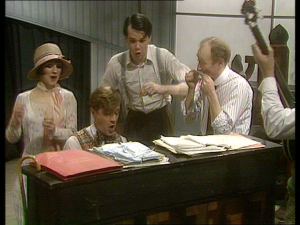by OLIVER WAKE
Out of the Unknown Writer: J.B. Priestley; Adapted from (novel): Mordecai Roshwald; Producer: Irene Shubik; Director: Rudolph Cartier

Set within a survival bunker and missile control base deep underground, Polish writer Mordecai Roshwald’s 1959 novel Level Seven was a grim depiction of the spiralling cold war leading to nuclear apocalypse. The story made no reference to specific nations engaged in the conflict but was cheekily dedicated “To Dwight and Nikita” in reference to Eisenhower and Khrushchev, then the premiers of the USA and USSR respectively.1 On publication, the novel was highly lauded by the likes of Bertrand Russell and Fred Hoyle, and J.B. Priestley called it “the most powerful attack on the whole nuclear madness that any creative writer has made so far” and began work on a film adaptation.2

Making enquiries in 1962, Irene Shubik, the story editor on ABC Television’s science fiction anthology Out of this World, found that the film option on the novel precluded any television version. The film version was announced in 1963, to be made by Eliot Martin and Philip Langner in association with the Theatre Guild of New York.3 It’s not clear if this was to use Priestley’s script or an alternative, but either way the project came to nothing. A few years later, Shubik was producing Out of this World’s BBC successor Out of the Unknown, when she was reminded of the novel. The film option had expired and Shubik wrote to Roshwald to express her interest in staging a television adaptation. Having re-read the novel, she told the author that she was “moved practically to tears by it. I do think it is an absolutely marvellous piece of work”.4
Mordecai Roshwald, Level Seven (London and Redhill: Ace Books, 1962), p. 2. ↩
Quoted on rear cover of Roshwald, Level Seven. ↩
John Montgomery, ‘Studio News’, The Stage and Television Today, 9 May 1963, p. 14. ↩
Quoted in Mark Ward, Out of the Unknown: A Guide to the Legendary BBC series (Birmingham: Kaleidoscope Publishing, 2004), p. 197. ↩

